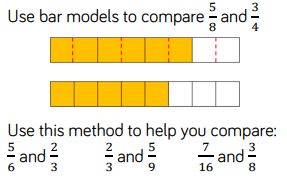02 April 2020: Home learning – maths guidance
Hi everyone!
Here is some guidance for today’s maths lesson – comparing fractions.
When comparing fractions with different denominators (the number on the bottom), you first need to make them the same – this is called finding the common denominator.
Let’s look at this example:
Compare 7/8 with 3/4
8 and 4 are our denominators – they are different. We need to make them the same.
8 is going to be our common denominator because we cant divide 7 into a whole number.
In order to make our fraction of 3/4 have a denominator of 8, we need to multiply the 4 (current denominator) by 2.
3/4 becomes 3/8
However, we must remember, whatever we do to the bottom, we do to the top.
3/4 becomes 6/8.
Now we can compare our fractions: 7/8 and 6/8
Which is bigger? Well 7/8 is bigger than 6/8 because it is a larger fraction.
Remember, 6/8 is the same as 3/4 – it is just written in a different way for the purpose of comparing.
So, we can say: 7/8 is bigger than 3/4 by 1/8.
How about if we are comparing 2/3 and 3/4.
Well, 3 doesn’t go into 4, so our common denominator will have to be a number that is a multiple of both 3 and 4.
12!
Let’s make our fractions have a common denominator of 12.
2/3 becomes 8/12 (multiplied the bottom by 4 so we multiply the top by 4)
3/4 becomes 9/12 (multiplied the bottom by 3 so we multiply the top by 3)
Which is bigger?
3/4 is bigger than 2/3 by 1/12!
I hope this helps.
Any further questions, please don’t hesitate to ask.
02 April 2020: Home learning
Morning, everyone!
I hope that you are all keeping safe and well.
Here are yesterday’s maths answers:
Y5
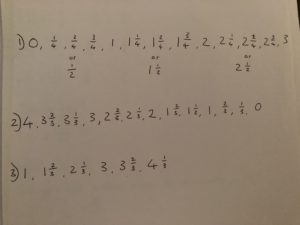


Y6


Here are today’s tasks:
Year 5 Maths – LO: compare fractions
2. Use common denominators to compare 1/3 and 2/5
*EXAMPLE 2/5 and 2/3 become…
6/15 and 10/15
2/3 is bigger by 4/15*
3.
Challenge:

Year 6 Maths – LO: multiply fractions

Challenge:
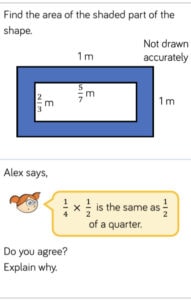
Year 5 and 6 Reading: LO: retrieval
Your task today is to read the text:

Then, once you have read it, have a go at the following crossword!

Year 5 and 6 Writing: LO: suffixes – tion
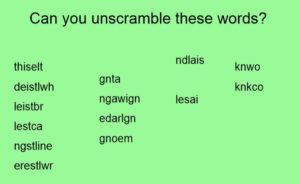



Finally, write a silly sentence for each of our focus words today.

As always, if you have any questions about any of the learning, please don’t hesitate to send me an email.
02 April 2020: Home learning
Morning, everyone!
It was great to see lots of you doing a range of activities to help you stay physically healthy yesterday!
It’s also important to have a healthy mind as well as a healthy body. Click the link below and have a go at these breathing exercise on GoNoodle.
Science
In our first science session this half term, we experimented what would happen to raisins in still water and in fizzy water.
If you can remember, the raisins sank to the bottom in still water and floated to the top in fizzy water.
After this, we asked questions about what would happen to the raisins in other liquids.
E.g.
Will the raisins float or sink in coca cola?
Will the raisins float or sink in olive oil?
Will the raisins float or sink in orange juice?
For today’s task I want you to pick 3 liquids and predict what will happen to the raisins and why.
Complete the sentence below for three different liquids.
I think the raisins will ______________ in ___________
because ______________________.
Let me know which three liquids you chose.
Reading
Today’s reading task is phonics.
Segment and blend the phase 5 words below.
stray play shout clouds cried pie
Now, read and write these sentences and fill in the gaps with the words above.
I like to ___________ outside in my garden.
There are lots of white ________ in the sky.
My friend __________ when he fell over.
I’m having a _______ for my dinner.
On my walk, I saw a __________ cat.
Maths
Similar to an addition task last week, I’ve written some calculations. This time, they are subtraction calculations.
Some are true and some are false!
Your task is to make a list of true calculations and a list of false calculations.
E.g.
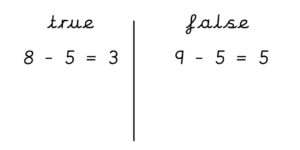
8 – 2 = 6
9 – 4 = 4
10 – 5 = 4
11 – 6 = 5
13 – 6 = 7
15 – 7 = 8
17 – 5 = 11
14 – 8 = 5
12 – 10 = 3
Challenge: Can you turn the false calculation into true calculations?
Good luck with today’s tasks 🙂
Mr Parker
02 April
Look what appeared in our garden yesterday morning!
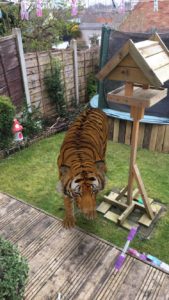
Luckily, this wasn’t real but it was our April fool based on Google 3D animals. Have you tried it?
Here are your daily physical and mindfulness activities plus today’s learning tasks.
Physical activity: The new #ThisisPE video is all about footwork patterns.
Mindfulness activity: Today, why not try this secret treehouse guided meditation.
Lexia
Today’s Lexia stars are Penelope, Zhuokai and Sunny who have achieved their next level.
Spellings
Just one more day until your spelling test. Here’s a reminder of this week’s words.
grinned, dropped, stumbled, confused, hurried, tidied, groaned, splashed
Why not try some word shapes with your spellings today. The tall boxes are needed for letters that have ascenders (b, d, h, k, l and t) and if there is a letter with a descender (f, g, j, p, q and y), then the box needs to be lower than the other boxes.

Task 1 reading
***** Apologies – here are the answers from yesterday’s Mystery Key comic comprehension. ******
We’ve had a query from a parent about whether answers for a reading comprehension should be recorded as a sentence or not. We tell the children that, in this instance, they do not need to answer in a full sentence but simply to record the answer as show below. Sometimes, this type of learning might be timed so the children are advised to use their time effectively and record simple answers. Hope that makes sense!
a.Why were the pirates following the map? to find the treasure/to use the key
b.Why did the pirates not want to go down the cliff? because ospreys might be there and they have sharp beaks
c.What did the pirates use a pulley for? to pull up the chest
d.Find and copy two words to describe the donkey. nosey and grey
e.Find and copy a word that means a box. chest
f.Put these places, that the pirates visited, in order.
4 Osprey Cliff 2 smoky volcano 3 stony valley 1 grey boulder beach
The adjectives used in the poem were mystery, grey, boulder, smokey, stony, nosey, grey and sharp.
1.Read through the fluency text again (below) and this time try to use some expression as you read.
Table Manners
The Goops they lick their fingers,
And the Goops they lick their knives,
They spill their broth on the table-cloth,
Oh, they live disgusting lives.
The Goops they talk while eating,
And loud and fast they chew,
So that is why I am glad that
I’m not a Goop. Are you?
By Gelett Burgess
2. Answer the following questions about the text.
a. What kind of text is this?
Choose one story instructions poem recount
b.Find and copy a word that means not very nice.
c.Find and copy a word that is an antonym (opposite) of quiet.
d.Find and copy a word that rhymes with new. What other words rhyme with new?
e.What does the word broth mean?
f.Find three things that the Goops do that are not good table manners.
3. This week our Living and Learning statement is I use good table manners.
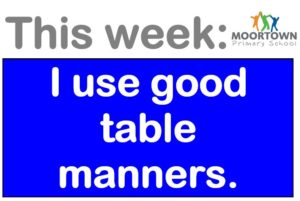
Discuss with someone the different table manners that we should use (not based on what the Goops do!).
Challenge: What do you think a Goop looks like? Draw and label a picture of one.
Task 2 maths
Here are your answers from yesterday.
1.
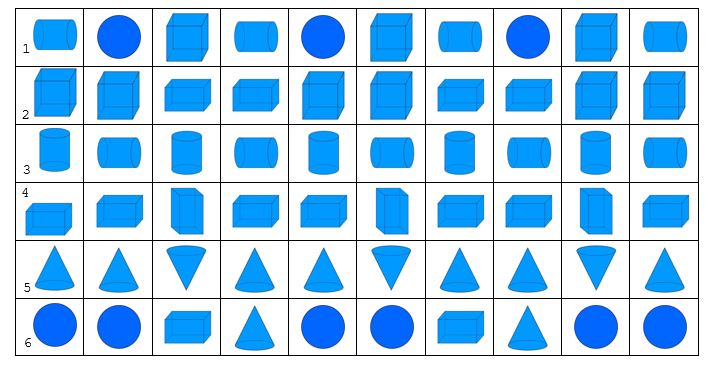
2. 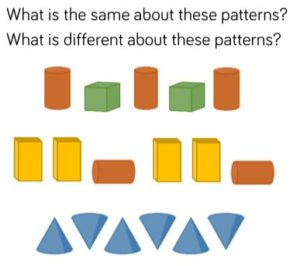
The first and second patterns use two shapes. The colours of the shapes are different. In the 3rd pattern, one shape is used in different orientations. In the 2nd pattern, the shape is used twice each time.
Today’s learning
Start by listening to this counting song from Super Movers.
Today’s learning is based on a problem from nrich maths website.

Challenge: Are there any other totals that would work?
Task 3 Toys now and then
Think back to the story, PEEPO!, from yesterday.
1.Discuss with someone if the things in PEEPO! are the same as now or different. How do you know?
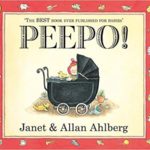
2.Using the picture of ‘porridge’ from the book, find three similarities (the things which are the same) to now and three things that are different.
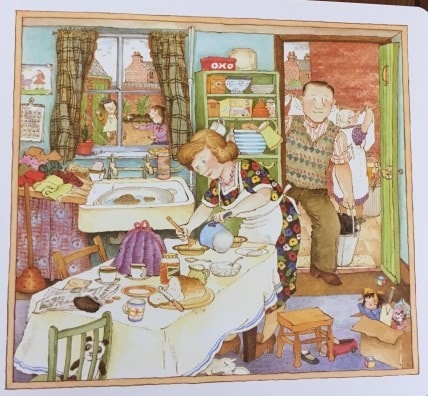
3. Look at the diagram below. Can you add more facts to it?
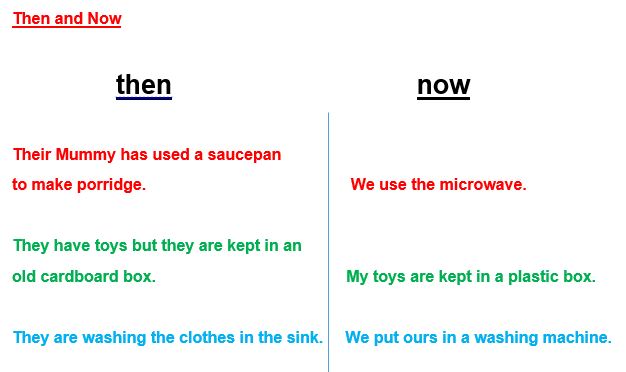
02 April 2020: Home learning
Spellings
Practise your spellings today by using the ‘rhymes and rememberings’ method.
happiness / loneliness / thoughtfully / painless / colourful / humming / wrapping / dripped / clapped / funniest / hottest / hopeful / wishful
Reading
Today, you’re going to be reading and performing poety. Make sure to read the poem out loud at least five times so you’re familiar with it and reading it fluently. Ask an adult if you don’t understand anything in the poem.
Then watch this video which explains how to perform poetry like a professional.
The poem to read and perform is ‘The Dentist and the Crocodile’ by Roald Dahl.

Maths answers

Maths
I’ve prepared addition and subtraction problems. You’ll need to click the link below to see them. Before jumping in to answer a question, they need to read the question carefully a couple of times and then decide whether they need to add or subtract. They should then perform the calculation. Check the answer to the calculation and then make sure they answer the question.
The first three questions are similar to problems we’ve already encountered this week.
The following four have data presented in a table or a chart. The numbers for these are smaller but the challenge comes from interpreting the data correctly.
The final three questions are two-step word problems where children need to do two things before getting to the answer.
(The answers to the questions are in the ‘Mark Scheme’ tab at the top.)
Good luck!
Writing

So what was on the other side of the fence? A monster? An enormous, unexplained hole? Mr Wilks bouncing on the trampoline?
In this lesson, I’d like you to think about what the boy was feeling at different parts of your story (feel free to reimagine it if you have new ideas).
For example: nervous, curious, excited, scared, shocked, etc.
I’d then like you to write six sentences beginning with a feeling. For example:
Curious, the boy peeked through the hole in the fence.
Intrigued by the noise, the boy moved tentatively towards the garden.
02 April 2020: Home learning
Morning everyone! And a big virtual high five to you all.

Reading
Today, you’re going to be reading and performing poetry. Make sure to read the poem out loud at least five times so you’re familiar with it and reading it fluently. Ask an adult if you don’t understand anything in the poem.
Then watch this video which explains how to perform poetry like a professional.
The poem to read and perform is ‘The Dentist and the Crocodile’ by Roald Dahl.

Maths
Today, you’re going to apply your multiplication knowledge to money problems. When we multiply money, remember we can still set it out in the column method – if we need to.
First, sort this list of questions into 2 categories. Category A is the list you would need to use your column method to multiply and category B you wouldn’t need your column method. Think about:
- is it a simple doubling?
- is there going to be an exchange?
- is there a simple related times table fact I can apply?

Here are some worded money multiplication questions. decide if you need to use the column method to multiply.
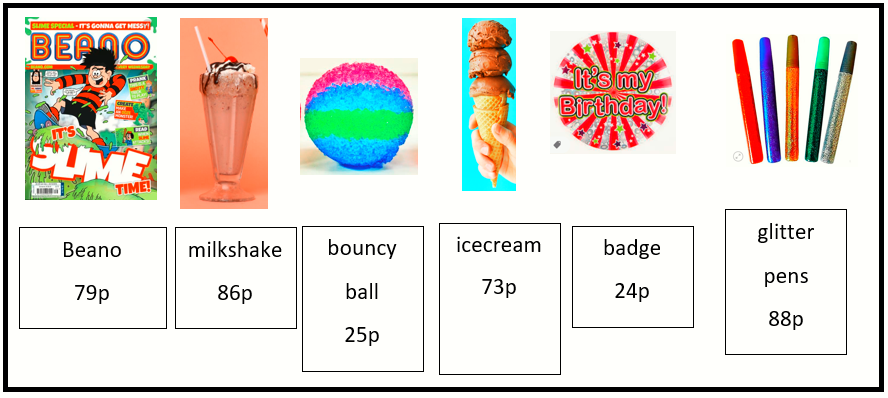
- How much does it cost to buy three bouncy balls?
- How much would two ice creams cost?
- How much would it cost to get the weekly Beano magazine for a whole month?
- How much would you spend in total if you were bought a birthday badge for five years straight?
- How mch would it cost to buy four glitter pen packs?
- How much would three ice creams cost?
Need a challenge?
These questions have two steps. First, you need to multiply (maybe twice) and then add your answers together.
- How much does it cost to buy two bouncy balls and two milkshakes?
- How much would two ice creams and three Beanos cost?
- How much would it cost to get two packs of glitter pens and four bouncy balls?
- How much would you spend in total if you got yourself and three friends a badge and an ice cream each?
- How much would it cost to buy four glitter pen packs and two milkshakes?
- How much would three ice creams and four milkshakes cost?
Writing

There was that noise again. This time it was louder and the ground trembled. I looked around to see if anyone else had heard it but my sister was too busy playing video games and my mum was on another Zoom conference call. I went into the garden and there it was again. A low rumbling noise. It was coming from next door’s garden. I tiptoed warily to the garden fence and peered through a hole. I couldn’t believe what I saw.
Continue the story. What did you see on the other side?
01 April
It’s April fools day – hope you haven’t been caught out yet!
Here are your daily physical and mindfulness activities plus today’s learning tasks.
Physical activity: Why not get active with some gymnastics skills today? We enjoyed this video from Max Whitlock yesterday. He will be live every Tuesday and Friday at 3:30pm. I’m sure Betsy will be having a go to practise her skills.
Mindfulness activity: Today, have a go at the rainbow breath activity on GoNoodle.
Lexia
There’s even more Lexia success today. Well done to Edith, Evie and Moosa who have achieved their next level.
Task 1 reading
1.Read through the fluency text again (below) and take account of the punctuation as you read. Also, remember to aim for 20 minutes of reading (of any texts) a day where possible.
Table Manners
The Goops they lick their fingers,
And the Goops they lick their knives,
They spill their broth on the table-cloth,
Oh, they live disgusting lives.
The Goops they talk while eating,
And loud and fast they chew,
So that is why I am glad that
I’m not a Goop. Are you?
By Gelett Burgess
2. Read the Mystery Key comic including words with the ey phoneme (last week’s spellings).
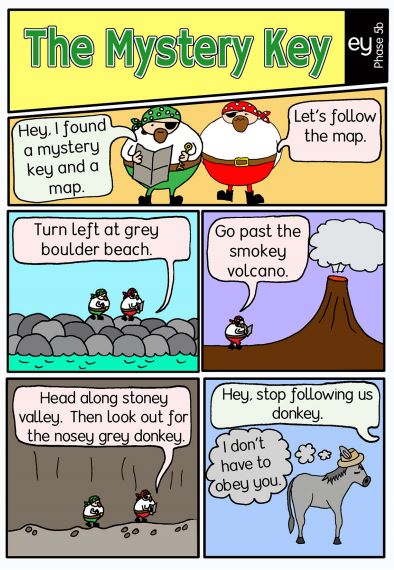
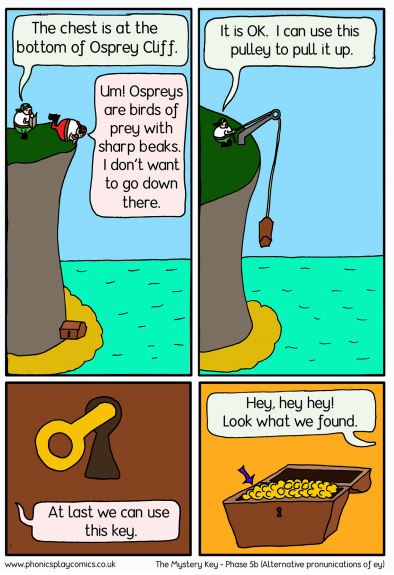
3. Answer the following questions about the text.
a.Why were the pirates following the map?
b.Why did the pirates not want to go down the cliff?
c.What did the pirates use a pulley for?
d.Find and copy two words to describe the donkey.
e.Find and copy a word that means a box.
f.Put these places, that the pirates visited, in order.
Osprey Cliff smoky volcano stony valley grey boulder beach
Challenge: Find all the adjectives (describing words) in the text.
Task 2 maths
Here are your answers from yesterday.
1.
The can should be in the ‘both’ set because it has flat faces and a curved surface.
2.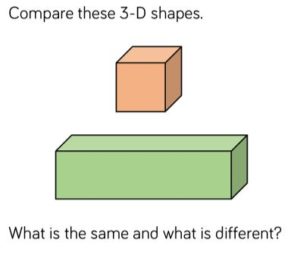
Same – both have square faces, 6 faces, 12 edges, don’t roll, can stack, no curved edges.
Different – name, colour, size, one only has square faces the other has squares and rectangles.
3.
Cube or cuboid
4.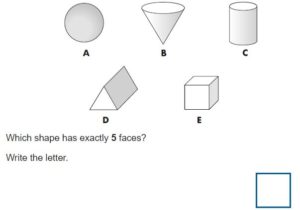
Shape D – the triangular prism
5.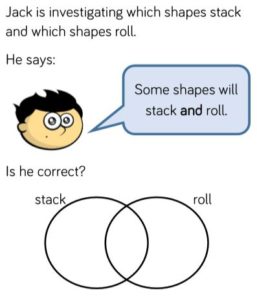
Some shapes with flat faces will stack – they will need to have flat faces on opposite sides (cubes, cylinders, cuboids).
Shapes with a curved surface will roll (cone, sphere, cylinder).
Some shapes with a flat face cannot be stacked (square based pyramid, cone).
Today’s learning
Start by listening to this 3D shape song.
Today, we are looking at patterns with 3D shapes.
1.Complete the following patterns based on the sequence so far.
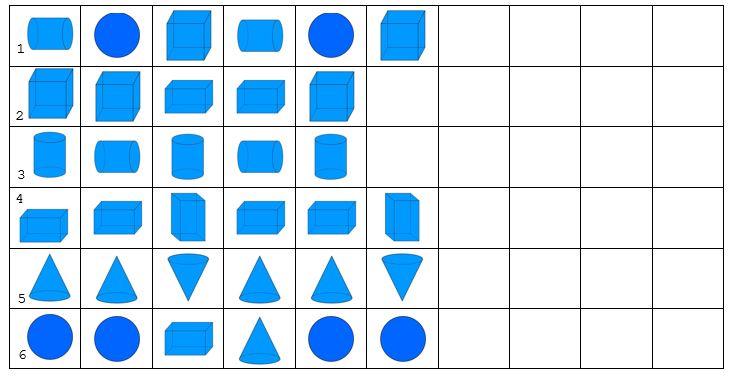
2. Try the following reasoning problem.
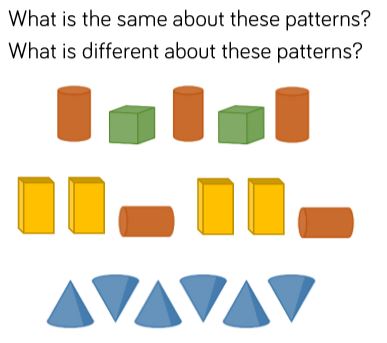
Challenge: Make your own repeating pattern using two different 3D shapes.
Task 3 Toys now and then
Read or listen to the story Peepo. Discuss that this story might be about when your grandparents were little.
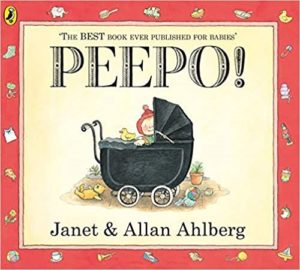
Draw a timeline in your book (like the one below) and label the years in decades (every 10 years).

Can you put the year you were born onto the timeline?
Can you find out when some of your family members were born and add then to the timeline? What will you need to do if someone was born in 1950?
Challenge: If somebody in your family is 50, what year would they have been born?
01 April 2020: Home learning
Morning, everyone!
April already – where does the time go?
A word from Mr Wain…
Hello again, everyone! I just wanted to say thank you for all the lovely emails you have sent – you have all been keeping really busy doing loads of fun and exciting stuff! From origami hats for pets to practising Pogo-stick skills, I’ve been amazed!
I myself have been exercising regularly using things around my home – resourceful! I’ve also been practising on the piano, refreshing my German speaking skills and baking cookies (inspired by you lot!) see below:

To the moment you’ve all been waiting for…
#HoHLF – Head over to the class news section of the website to check out our very first Hall of (Home Learning) Fame – congratulations to all of you who have claimed your place on the legendary, first-ever #HoHLF!
Keep safe and well guys and keep spreading the positivity! Remember, I’m only an email away at: oliwain@spherefederation.org
A word from Miss Wilson…
Hi guys! Hope you’re all doing well and you’re not missing school too badly.
Thanks to everyone who sent an email updating me with what you’ve been up to. There were so many with such detail so I’m sorry if your reply took a little while! It was great to see the fab things you’ve been doing including some brilliantly creative learning.
Check the class news page for Y6 for the grand opening of the Hall of (Home Learning) Fame and congratulations to all who have nabbed a highly coveted place on the list!!!
I’ve been keeping busy with walks/cycles around Roundhay Park, a 1000 piece jigsaw puzzle (don’t knock it until you’ve tried it) and honing my FIFA skills – although, I am the second best out of a two person household. This time away from school seems to have flown for me and I think it’s down to a positive mindset and keeping busy. If you’re feeling lonely, reach out to someone and talk! If you’re feeling great, reach out to someone and spread the positivity!
Take care, guys!
Now, to today’s learning…
Year 5 Maths – LO: number sequences
Today’s learning is all about counting in fractions.


Challenge:

Year 6 Maths – LO: subtracting fractions
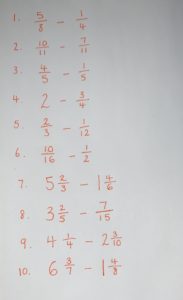
Challenge:
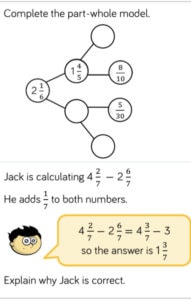
Year 5 and 6 Reading – FirstNews
Today’s task for reading is to read the following FirstNews paper! Click here to access it: FirstNews paper – Wednesday.
Like we do in class, you could discuss your favourite articles with people in your home, research something that has caught your interest further, or simply read for pleasure.
It would be really cool if you could share your favourite articles with us and why you liked them!
Year 5 and 6 Writing – LO: audience and purpose
Today’s writing task is to write to persuade.
This is to convince someone to do or think something/change their mind about something.
You need to have a think about something that you have done at home over the last few weeks, have just started recently or are planning to start soon.
This could be: baking, exercising, practising an instrument, practising a language skill, practising a sport (like kickboxing), speaking with family members over FaceTime, speaking with friends, playing a game, meditating etc…
Let’s say that you have been practising an instrument. You need to convince the reader that during this uncertain time, the one thing they must do is to practise an instrument, too. Whatever you want to persuade your reader about, you have to write in a persuasive way by providing benefits they can’t argue with!
Remember back to when we wrote persuasively in class:
Y5 – We wrote to Mrs Weekes persuading her about what to do with the plot of land behind school.
Y6 – We wrote to Theresa Villiers about stopping the use of palm oil.
R2s for persuasive writing:
- Formal language: I implore you/without a doubt/although…I firmly believe that…/
- Flattery: Surely someone as forward thinking as yourself would agree that…
- Rhetorical questions: Do you not want to become impress your friends and family with your new skill?
- Facts: these could be found by doing some research
- Opinions: be careful – we want the reader to take this seriously -As a result of practising the violin, I have experienced great joy and pleasure
Can you include any of the following, too:
- Parenthesis: – , ( )
- Relative Clause: Cycling, which is my favourite hobby, is a great way to keep healthy.
- Colons to introduce a list: Cycling, which is my favourite hobby, has many benefits: increased cardiovascular fitness, increased muscle strength, improved posture and reduced stress.
- Semi colons to separate items in a list: Cycling, which is my favourite hobby, has many benefits: increased cardiovascular, muscle and joint fitness; increased posture, coordination and mental well-being; and opportunities for fresh air.
As always, if you have any questions about any of the learning, please don’t think twice about sending a quick email and we will try our best to help you!
Keep well and stay safe – good luck!
01 April 2020: Home learning
Morning, Year One!
I’ve been taking part in PE with Joe Wicks and going for one walk a day to stay fit and healthy. What exercise have you been doing to stay healthy?
If you can, remember to practice some of the PE skills you learnt in school.
If you’ve got a garden, go outside and practice throwing and catching a ball. Remember to always keep your eyes on the ball and have your hands ready! Can you throw the ball into the air and clap your hands before catching it?
Can you throw it against a wall and catch it?
How many catches can you do in 1 minute?
As you can tell, I’m missing teaching PE!
Writing
Write sentences about what you can see.
Can you use ‘and’ in your sentences?
E.g.
A zebra is crossing the road and a lion is sitting on top of a van.

If you want to see the picture clearer, click on the link below.
http://www.pobble365.com/animal-town/
Reading
Read (or ask an adult to read) a story of your choice. Once you’ve read the story, ask an adult in your house to be one of the main characters from the story.
Then, write five questions that you want to ask the character and interview them.
This is called ‘hot seating’.
Below are some questions I wanted to ask Dave after I read, ‘Dogger’:
Why do you love Dogger so much?
How did you feel when you lost Dogger?
Where did you find Dogger?
Who got Dogger back for you?
How did you feel when you got Dogger back?
Maths
Today’s maths focuses on bridging through 10.
You will use the strategy of partitioning to make 10 first and then subtract the remaining amount.
Partitioning means breaking the number into two parts. This will make the calculation easier.
E.g.

Using the examples, complete the calculations below.
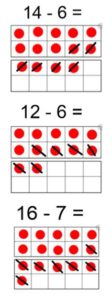
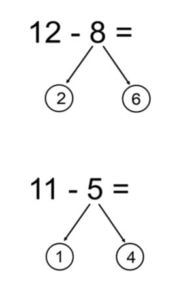
Challenge:

01 April 2020: Home learning
Hooray! It’s April. I never thought I would but I actually miss writing the date on the board. Obviously, I miss you all telling me I’ve written the wrong date from time to time, too! Congratulations on making it to Wednesday – we’re half way though our week, our home learning and it’s almost Easter. I wonder how many of you have pulled an April fools’ joke at home… let me know!

Reading
Today, you’re going to draw the boy and the fox from the video ‘The Catch’ that you’ve been looking at this week.
Then, write a speech bubble suggesting what the two characters would say to each other at the beginning of the story. And then another one for each character, at the end. Make sure you rewatch the clip and check you feelings graph from yesterday to show how they were both feeling at the time.
Spellings
Practise your spellings today by using the ‘silly sentences’ method.
Maths
Today, we look at multiplication.

History
You guys have learned loads about the Romans and Celts (especially Boudicca) in this topic and you’ve really impressed me with your history knowledge and historical enquiry skills.
We’re going to end this topic by looking briefly at the people who invaded and settled in Britain after the Romans left: the Anglo-Saxons.
I’d like you to watch the video, do the activity and read the text on the following webpage (make sure Flash isn’t blocked as this might stop you watching the video).
https://www.bbc.co.uk/bitesize/topics/zxsbcdm/articles/zq2m6sg
Please answer the following questions about the Anglo-Saxons in any way you like. You could simply write or type the answers, create a poster, create a digital presentation, interview an Anglo-Saxon or Britain from the time. It is us to you (and your parents).
- When did the Anglo Saxon age begin in Britain?
- Where did the Anglo Saxons come from?
- Tick the answer that is true:
- The Anglo-Saxons were ruled by one king who took control of the whole of Britain.
- The Anglo-Saxons were made up of different tribes who settled in different parts of Britain.
- Who were the biggest tribes?
- When they weren’t fighting, what was the main job that Anglo Saxons did?
- What was life like for Anglo Saxon girls and boys?
- Name three types of crops that Anglo Saxon farms grew.
- Name two types of animal that Anglo-Saxon hunters used to help them catch their prey.
Challenge: Which period of history do you think was more advanced: Roman or Anglo-Saxon Britain? Explain your reasons.
